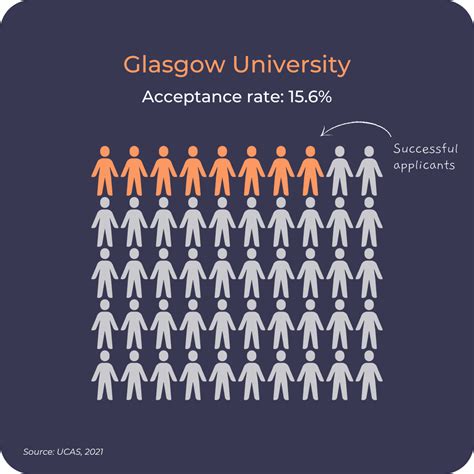Understanding the University of Glasgow Acceptance Rate
The University of Glasgow, renowned for its academic excellence, is highly competitive with a selective admission process. The acceptance rate provides a glimpse into the university’s selectivity and helps prospective students gauge their chances of admission.

The university’s acceptance rate varies slightly depending on the specific program and year of application. Let’s explore the overall acceptance rate and delve into the factors that influence it.
Acceptance Rate: A Closer Look
For the 2023/2024 academic year, the overall acceptance rate at the University of Glasgow was 22.7%. This means that out of every 100 applications received, approximately 23 were accepted.
Factors Influencing Acceptance
The acceptance rate at the University of Glasgow is influenced by various factors, including:
- Academic qualifications: Candidates with strong academic records and high grades in relevant subjects are more likely to be accepted.
- Personal statement: The personal statement allows applicants to showcase their skills, experiences, and motivations. A compelling statement can enhance an application’s competitiveness.
- References: Positive references from teachers, employers, or mentors provide valuable insights into the applicant’s character and abilities.
- Entrance exams: Certain programs within the university may require applicants to take entrance exams, such as the UKCAT for medicine or the LNAT for law. Strong performance on these exams can improve chances of admission.
- Program competitiveness: Some programs within the university are more competitive than others due to high demand. This can lead to lower acceptance rates for those programs.
Enhancing Your Chances of Acceptance
While the acceptance rate provides an indication of the university’s competitiveness, it is important to note that each application is considered individually. Here are some tips to enhance your chances of acceptance:
- Excel academically: Focus on achieving high grades in relevant subjects and demonstrate consistent academic performance.
- Craft a compelling personal statement: Highlight your unique skills, experiences, and motivations for pursuing your chosen program.
- Secure strong references: Request references from individuals who can attest to your character, work ethic, and potential.
- Prepare for entrance exams (if applicable): If the program you are applying to requires entrance exams, thoroughly prepare for them to achieve a competitive score.
- Consider less competitive programs: If you are aiming for a highly competitive program, consider applying to less competitive programs within the university that align with your interests.
Alternatives and Considerations
If you do not receive an offer from the University of Glasgow, or if you are considering other options, explore the following:
- Other Scottish universities: Scotland is home to other prestigious universities with competitive programs, such as the University of Edinburgh, the University of St Andrews, and the University of Aberdeen.
- International universities: Consider applying to universities outside of Scotland, as they may have different acceptance criteria and admission requirements.
- Gap year: Utilize a gap year to enhance your application by gaining work experience, volunteering, or pursuing personal development opportunities.
Conclusion
The University of Glasgow acceptance rate provides valuable insights into the university’s selectivity. While the acceptance rate is an important consideration, it is crucial to approach the application process holistically. By presenting a strong application and showcasing your strengths, you can increase your chances of admission to this esteemed institution.
Additional Resources:
- University of Glasgow Admissions website
- Scotland’s universities see record number of applicants as acceptance rate falls
- How to get into a top university
